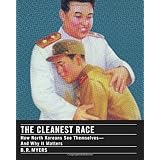
Average Reviews:

(More customer reviews)I knew that B. R. Myers was a contributing editor, I believe, for "The Atlantic," my favorite periodical. I had no idea that he was also a student of the Korean Peninsula, especially the "Hermit Kingdom" north of the 38th parallel. Christopher Hitchens reviewed this book for "Slate" today, and after catching it this morning, I drove to my local Barnes & Noble in the vague hope they might have a copy. I was shocked that they had a copy in stock. And I was not able to put this fascinating book down.
Myers objective is, by explaining North Korea in the roots of its modern past, to try to make some form recommendations as to how the world community can deal with this strange and blinkered land. His ultimate conclusion is, unfortunately, rather gloomy, arguing essentially that containment and "benevolent neglect" are the only methods to deploy against a regime that, by its own self-definition, is as fixed and unchangeable as a steel and cement mold. All this short of actual military confrontation no one exterior to North Korea wants.
But, this is not the best part of the book. Myers advances and, I think, proves that North Korea is purely a product of its all-pervasive propaganda which literally soaks every aspect of daily life, twenty-four seven, learned in part from the brutal occupation tactics of the Japanese between 1905-1945. And this propaganda supports the two pillars of this Orwellian moonscape, the military and the Kim clan, arguably the most successful crime family since the fictional Corleones. North Korea is no longer properly understood as a "communist" society. Indeed, the very word was removed from the latest Constitution in favor of the long-evolving bogus governmental policy of "Juche," the military elites celebrated as a class in support of a paranoid "imperial family" who have gone to absurd lengths to soldify their dread power over a population kept in absolute, deliberate ignorance of the world outside; even going to far as to use low-level malnutrition as a method of social control. Myers uses mutitudinous examples of past and contemporary North Korean governmental propaganda to illustrate the depths to which this control is exercised. And the consistent keys struck over and over are: (a) absolute fear of the "outside," especially South Korea, Japan, the United States, and even China to a limited extent; (b) the fostering of a divine cult around the ruling family (even suggesting the future "quasi-resurrection" of the dynastic founder); (c) glorification of the military establishment, including the nuclear programme as nationalist expression; and (d) institutionalized racism that also extendes into eugenic practices to keep the Korean race "pure." And all this is overlaid with a perverse form of warped Confucianism where deference to authority is posited as the highest of social aspirations. Put in radically simpler terms, North Korea is best understood less as nation-state than religious cult where the "Dark Other" is the rest of the earth itself.
I also note that Myers descriptive prose is very powerful, but made more so by ample visual examples in the book which are not "filler" but artfully chosen to illustrate main points. Excellent visual and written editing all the way around.
I admit that using propaganda alone as a basis for historical conclusions is usually a spotty exercise. But in a nation where that propaganda is the essence of the state and the people its creations from cradle to grave, I think the basis far more firm than, say, it would be in a discussion of modern China, for example, or Soviet-era Roumania. On this sure footing, and backed by what is obviously years of work and scholarship, Myers makes a complelling case that any dealings with North Korea must be informed by an understanding of how it sees itself, as horrible that vision may be.
Recommended without reservation, especially to people interested in political science, cultural history, and East Asian Studies.
Click Here to see more reviews about: The Cleanest Race: How North Koreans See Themselves and Why It Matters

0 comments:
Post a Comment